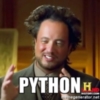DeepState
Multi-Strategy, Quant and Fundamental
- Joined
- 30 March 2014
- Posts
- 1,615
- Reactions
- 81
The ultimate idea to is to find an edge that works well enough to make money on average through time...or, at least, be entertaining enough to keep your interest.
To this end, "Quant", with this broad meaning encapsulating:
+ data sciences which allow the gathering and analysis of vast amounts of information;
+ statistics which allows an investor to utilise another means to test their thinking;
+ quantitative finance which allows for increasingly rigorous and sophisticated concepts to be applied to pricing, portfolio optimisation and trading (for example); and
+ technology to harness information for investment/trading, organise this information rapidly and acccurately (as coded) and place ideas into the market quickly and efficiently...
can bring tools which are helpful to some investors. So it is with the power of speech and the ability to write, for example. It is possibly helpful but can be misapplied or abused accidently or purposefully.
Not all who can read do so with equal value. Not all who can speak have much with is worth saying. Not all who can codify a random forest can see the wood for the trees. Running a neural net over a single time series for prediction of a share price may not very smart. Still, I'd rather be able to speak and write than not.
Anyone can have an opinion. Very few opinions in investment withstand even the slightest quant analysis. Quant analysis helps with finding the truth. It will sometimes fail in this endeavour or give unreasonable confidence in its assertions.
"Individual results may vary."
I feel reasonably confident that, on the whole, speech and reading have added to human capacity. So it is with quant.
To this end, "Quant", with this broad meaning encapsulating:
+ data sciences which allow the gathering and analysis of vast amounts of information;
+ statistics which allows an investor to utilise another means to test their thinking;
+ quantitative finance which allows for increasingly rigorous and sophisticated concepts to be applied to pricing, portfolio optimisation and trading (for example); and
+ technology to harness information for investment/trading, organise this information rapidly and acccurately (as coded) and place ideas into the market quickly and efficiently...
can bring tools which are helpful to some investors. So it is with the power of speech and the ability to write, for example. It is possibly helpful but can be misapplied or abused accidently or purposefully.
Not all who can read do so with equal value. Not all who can speak have much with is worth saying. Not all who can codify a random forest can see the wood for the trees. Running a neural net over a single time series for prediction of a share price may not very smart. Still, I'd rather be able to speak and write than not.
Anyone can have an opinion. Very few opinions in investment withstand even the slightest quant analysis. Quant analysis helps with finding the truth. It will sometimes fail in this endeavour or give unreasonable confidence in its assertions.
"Individual results may vary."
I feel reasonably confident that, on the whole, speech and reading have added to human capacity. So it is with quant.
Last edited:


